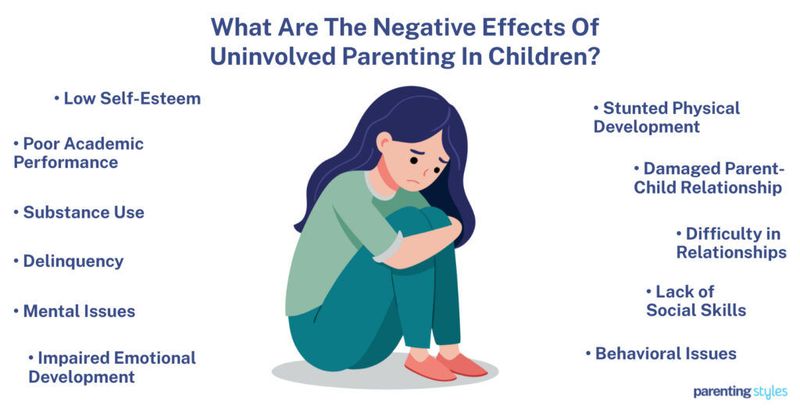Parents play a crucial role in shaping the lives of their children, yet some characteristics may inadvertently create distance rather than closeness. Recognizing these traits helps to understand family dynamics and potentially bridge gaps. This examination sheds light on common personality traits that may hinder a strong parent-child bond. By exploring these tendencies, we can gain insight into the emotional and psychological barriers that may cause parents to drift apart from their children, affecting both parties in profound ways. Understanding these traits is the first step towards fostering healthier and more connected family relationships.
1. Overcritical Nature

An overcritical nature often leads to strained relationships, especially between parents and their children. When criticism becomes a frequent visitor, children might feel unworthy or incapable.
This constant scrutiny can result in a lack of self-confidence, making kids hesitant to share their thoughts openly.
The emotional chasm might widen as children grow, carrying the weight of unrealistic expectations. The parent-child bond, once tender, becomes rigid, creating an emotional divide. Criticism, when constructive, can indeed be beneficial, but constant negativity can be damaging.
Finding a balance is essential to nurture healthy relationships. A kind word can go a long way.
2. Lack of Empathy

With empathy absent, a parent might unintentionally neglect a child’s emotional needs. Children yearn for understanding and compassion, and without it, they may feel isolated.
A lack of empathy can make children hesitant to share their feelings, fearing misunderstanding or judgment. As they grow, they may seek solace elsewhere, finding comfort in friends or other confidants.
This emotional disconnect can stand as a barrier to closeness, leaving both parent and child feeling misunderstood. Building empathy is vital to bridging the emotional gap, fostering an environment where children feel valued and understood, laying a foundation for trust and love.
3. Authoritarian Approach

Authoritarian parenting can create an environment where children feel more like subjects than cherished family members. Rules reign supreme, often overshadowing compassion and flexibility.
With a rigid structure, children might feel they have little room to express themselves or grow independently. This approach can stifle creativity and hinder open communication.
The distance widens as children might fear reaching out, worried about repercussions instead of seeking guidance. While discipline is important, balancing it with love and understanding cultivates a nurturing atmosphere. Children thrive on trust and freedom, which a rigid approach can deeply hinder.
4. Emotional Unavailability

An emotionally unavailable parent creates an invisible wall that can be hard to dismantle. Children often crave attention and emotional connection, and when these needs are unmet, they tend to retreat.
The subtle neglect can manifest in children as feelings of abandonment or neglect, seeking affirmation elsewhere. As time progresses, the emotional distance grows, making it challenging to reconnect.
To bridge the gap, parents need to practice active listening, showing genuine interest in their child’s world. It’s never too late to open up emotionally, fostering warmth and understanding, and creating a supportive bond.
5. Inconsistent Discipline

Inconsistent discipline can leave children feeling uncertain and insecure about boundaries and expectations. One day a behavior is acceptable, the next day it’s not; this unpredictability can cause confusion.
As children struggle to understand what’s expected, they may distrust their parent’s guidance. This inconsistency can erode trust, as children feel lost in a world of shifting rules.
A stable and predictable environment helps children feel secure and valued. Consistency in discipline fosters trust and respect, guiding children with clear expectations. Parents who maintain consistency cultivate a sense of safety and open communication within the family.
6. Narcissistic Tendencies

Narcissistic tendencies can overshadow a child’s needs, making the parent-child relationship feel one-sided. A parent absorbed in their reflection might overlook important emotional cues.
Children may feel like secondary characters in their own stories, struggling to find their voice. This imbalance can breed resentment, as the parent’s needs take precedence over the child’s.
Fostering a mutually respectful relationship requires self-awareness and a willingness to prioritize the child’s emotional well-being. By recognizing these tendencies, parents can work towards a healthier dynamic, ensuring that both voices are heard and valued within the relationship.
7. Absence of Communication

Without communication, a parent-child relationship can turn into a silent void. Children need conversation to feel connected, and without it, they might feel invisible.
Lack of dialogue can lead to misunderstandings, leaving both parties feeling unheard and disconnected. Children may turn to others for the interaction they crave, widening the chasm within the family.
Open lines of communication are essential for building trust and understanding. Encouraging dialogue and actively listening can transform silence into meaningful exchanges. A family that communicates thrives on shared stories, laughter, and mutual support, bridging any divide and fostering genuine connection.
8. Perfectionist Standards

Perfectionist standards can place an immense burden on both parent and child, creating a tense and stressful environment. When nothing is ever good enough, children might feel they constantly fall short.
This relentless pursuit of perfection can overshadow achievements, leaving children feeling inadequate. The pressure can stifle creativity and self-esteem, making children hesitant to try new things.
Embracing imperfection fosters growth and resilience. Parents who acknowledge and celebrate progress, rather than perfection, encourage a supportive atmosphere where children feel free to explore their potential, knowing they are accepted and loved just as they are.
9. Neglect of Personal Interests

When a parent neglects their personal interests entirely for their child, it might sound positive, but it can lead to resentment. Children might feel guilty for being the reason their parent abandoned their passions.
This sacrifice can create an emotional distance, as children sense their parent’s unfulfilled dreams and desires. Balancing personal interests with family life is key to healthy relationships.
Parents should model a well-rounded life, showing children that it’s okay to pursue one’s passions while also being present. This balance fosters a rich environment where both parent and child can thrive, sharing joy and fulfillment.
10. Unresolved Personal Issues

Unresolved personal issues can spill over into a parent’s relationship with their child, creating an unspoken tension. Children are perceptive and can pick up on their parent’s emotional state, affecting their sense of security.
The stress from unresolved issues can lead to irritability, affecting how a parent interacts with their child. This emotional strain can drive a wedge between them, leaving the child feeling neglected.
Addressing personal issues is crucial for maintaining a healthy family dynamic. Seeking help and working through challenges can lead to personal growth, benefiting both parent and child, and strengthening their bond.
11. Overbearing Control

Overbearing control can suffocate a child’s growth and independence, leaving them feeling trapped. Parents who micromanage every aspect of their child’s life deprive them of the opportunity to learn and grow.
This control can stifle creativity and independence, leading to frustration and rebellion. Children might feel they have no say, causing them to withdraw.
A balanced approach fosters independence and confidence. Allowing children to make their own choices and learn from mistakes creates an environment of trust and respect. By letting go of the reins, parents can nurture a strong and loving relationship, encouraging a sense of freedom and individuality.

